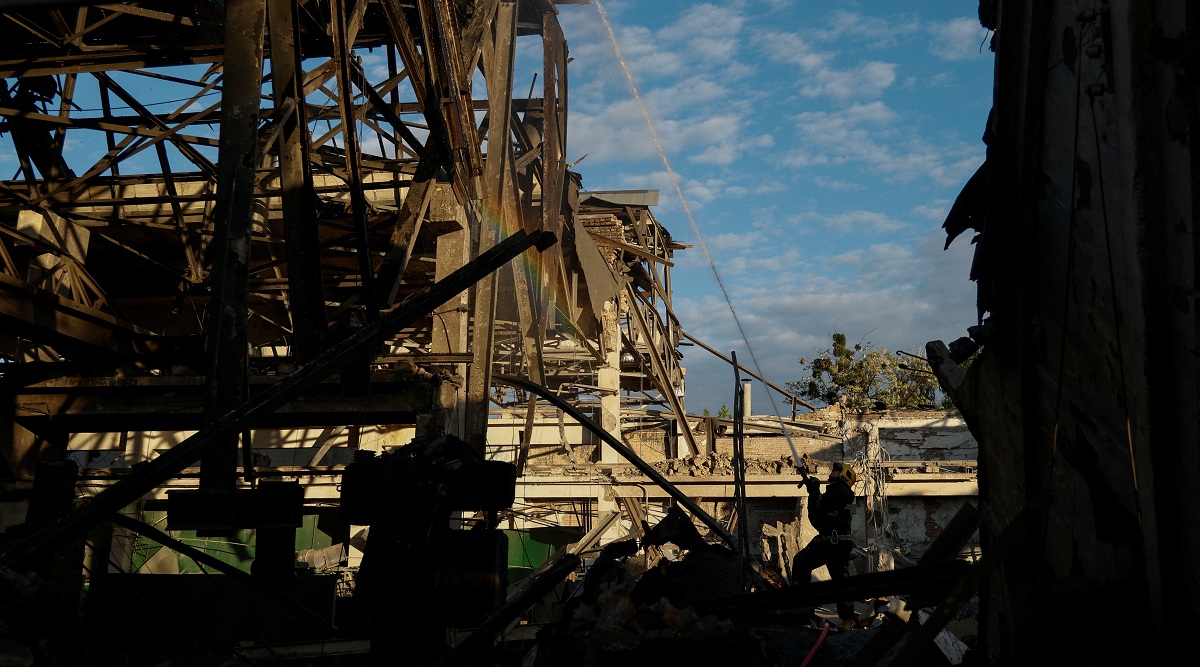
As the invasion of Ukraine completed 100 days and Russia renewed strikes on Kyiv, resistance in the form of cyber attacks persisted as the Russian Ministry of Construction, Housing and Utilities website appeared to have been hacked. Reports said that an attempt to open the website through an internet search led to a “Glory to Ukraine” sign in Ukrainian.
Massive cyber-attacks from Russian-sponsored threat actors commenced on the day Ukraine was invaded, prompting Kyiv to assemble an ‘IT army’. The ‘IT Army’, also endorsed by Ukrainian officials, sought help from technology leaders to fight these cyber attacks.
“We are creating an IT army. We need digital talents. There will be tasks for everyone. We continue to fight on the cyber front. The first task is on the channel for cyber specialists,” tweeted Mykhailo Fedorov, Ukraine’s Vice Prime Minister and Minister for Digital Transformation.
The retaliation began as early as the day of invasion on February 24, with the hacker group Anonymous declaring it has commenced a “cyber war” against Kremlin. Within a day, the group claimed to have brought down several government websites, including that of the state news agency RT News.
Over the next week, the group was behind leaking the database of the Russian Ministry of Defence, intercepting Russian military communications, and hacking TV channels to broadcast the “reality of what is happening in Ukraine”. By February 28, the Russian government’s website was down and maritime data was manipulated to make it appear as if President Vladimir Putin’s luxury yacht had crashed into Ukraine’s Snake Island and was making its way to the destination “hell”.
Further, Anonymous and its affiliate groups sent 7 million text messages to Russian citizens about the war in Ukraine in March.
The collective announced it disrupted streaming services Wink and Ivi and that an affiliated group had shut down Russia’s space agency so Putin ‘no longer has control over spy satellites’. The head of Roscosmos Control Center, where the space agency server was allegedly shut down, denied Anonymous’ claim. “The information of these scammers and petty swindlers is not true,” according to the head. Altinfo TV channel in Georgia, which distributed Russian propaganda and supported Russia, was asp hacked and all the content on it was deleted.
By May 11, the collective hacked Russia’s video platform RuTube, affecting nearly 75 per cent of the database and infrastructure of the main version and 90 per cent of the backup and cluster to restore the databases. Effectively, this hack would spell the end of RuTube, Anonymous said in a tweet. Sberbank, Russia’s largest bank, was hit and purported images of children who died in the war appeared on the Russian locomotive manufacturing website.
The group also hacked into printers across Russia for two hours and printed over 1,00,000 copies of anti-propaganda material. In its recent activity, Anonymous leaked approximately 1TB of data from a leading Russian law firm identified as Rustam Kurmaev and Partners (RKP Law).
Squad 303, a Polish hacking team named after a famous Polish fighter squadron in World War Two, reportedly built a website allowing people to send text messages to Russian phone numbers at random to tell them the truth about the war, the BBC reported.
And as Putin prepared to address the country during the annual Victory Day parade last month, the names of all programmes on television schedule pages were replaced with the message: “The blood of thousands of Ukrainians and hundreds of murdered children is on your hands. TV and the authorities are lying. No to war.” Major channels, including Channel One, Rossiya-1 and NTV-Plus, were affected, the BBC reported. The Washington Post said the same message appeared on platforms run by IT giant Yandex.
In a meeting with the Russian Security Council over a week later, Putin admitted that the number of cyber attacks by foreign “state structures” had increased several times over. “Experts believe it would not be possible for lone hackers to achieve that. The hackers attack from different countries in a well-coordinated effort. These attacks are conducted by state-run structures, and we know that the armies of some countries officially include cyber troops,” he said. He called for bolstering the country’s cyber defences by reducing the use of foreign software and hardware.
In a meeting with the Russian Security Council over a week later, Putin admitted that the number of cyber attacks by foreign “state structures” had increased several times over. “Experts believe it would not be possible for lone hackers to achieve that. The hackers attack from different countries in a well-coordinated effort. These attacks are conducted by state-run structures, and we know that the armies of some countries officially include cyber troops,” he said. He called for bolstering the country’s cyber defences by reducing the use of foreign software and hardware.
No comments:
Post a Comment